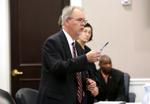9th Circuit public defender announces retirement after decades serving the accused | News
[ad_1]
Ashley Pennington has announced he will be retiring after 14 years as the 9th Circuit Public Defender, the capstone on a decades-long career mostly spent representing some of the poorest residents in local courthouses.
The public defender said he will be returning to private practice after he retires on Aug. 2, but he would continue to work to address some of the systemic problems that plague the state’s criminal justice system.
The 9th Circuit Public Defender Selection Panel, a five-member body elected by Charleston and Berkeley counties’ bar associations, is currently reviewing applications from attorneys seeking to become the next public defender, Pennington said. The panel will refer a candidate to the S.C. Commission of Indigent Defense, which has final authority on the appointment.
Pennington, 66, was appointed to serve as the 9th Circuit’s first public defender in 2008 after state lawmakers passed the Indigent Defense Act, which created the new state office. Before then, each county was responsible for ensuring its indigent residents were represented in criminal cases.
Pennington has been reappointed every four years since, managing an office of 40 attorneys that defend indigent men and women accused of crimes in Berkeley and Charleston counties.
As the circuit’s first public defender, he helped shape the position, emphasizing the importance of connecting defendants with social services that that can help them escape the cycle of arrest and incarceration.
Pennington has also represented some of the most notorious defendants in the Lowcountry, including Dylan Roof, a White supremacist who killed nine people in 2015 at Emanuel AME Church, and Ryan Deleston, who gunned down 17-year-old Marley Lion in 2012 outside a West Ashley bar.
Colleagues said Pennington’s tenure as public defender was defined by hard work, sincerity and compassion.
Ninth Circuit Solicitor Scarlett Wilson said Pennington was an “honest adversary” who has the wisdom to help his clients see the big picture. He is a man guided by faith, as exemplified by the work he did on weekends helping formerly incarcerated men and women reintegrate into society, Wilson said.
“The two of us could not be more different, but, in many respects, I consider him a mentor,” she said.
Kristy Danford, director of the Charleston County Criminal Justice Coordinating Council, said Pennington has been a leader for the organization, which has worked to address jail overpopulation and racial disparities in the criminal justice system.
Pennington and his staff pioneered public defender representation in the bond court, a first for the county, and chaired the committee that rewrote the organization’s bylaws, Danford said.
“He steps up to take on challenging issues, pushes debate where it is needed, and helps us find a way forward together,” Danford said. “He is a remarkably good man who cares deeply about this community.”
Charleston attorney Mark Peper said Pennington would be “sorely missed.”
“His work ethic and ability to manage the office was evident, but his best attribute was his passion for people,” Peper said.
A career in public defense
Pennington began his career in 1980 with the Richland County Public Defender’s Office after earning his law degree from the University of South Carolina. He said at the time resources for indigent defense in the state were paltry — he made $14,000 a year as an assistant public defender in 1980, or less than $50,000 in today’s dollars.
Pennington, a Catholic, said his faith helped lead him into public service.
After Richland County, Pennington spent several years as a federal defender in Chicago. He and his wife, Robin, moved to Charleston in 1988 to be closer to family after their first child was born, he said.
He worked for the Charleston County Public Defender’s Office upon his return. He was named executive director of the office in 1991, a position he would hold until 2002. He went into private practice for seven years after that, but returned to the executive director position in 2007. The following year, he was appointed the 9th Circuit Public Defender.
Pennington served as president of the S.C. Public Defender’s Association from 1996 to 2000 after a five-year stint as vice president. He also previously served on the board of directors for the S.C. Association of Criminal Defense Lawyers and chaired the S.C. Bar Association’s Criminal Law Council.
Gov. Jim Hodges awarded Pennington the Order of the Palmetto, the state’s highest civilian honor, in 2002.

Ninth Circuit Public Defender Ashley Pennington speaks during a court hearing. Pennington announced April 22, 2022, that he would be retiring as circuit public defender after 14 years in the role. File/Grace Beahm Alford/Staff
Pennington’s tenure has not been without controversy.
In 2014, a former assistant public defender sued his ex-boss claiming he was fired for raising ethics concerns about Wilson and her office.
Pennington denied the allegations and the lawsuit was settled last fall for $605,000. Neither side admitting wrongdoing, but the episode provoked strong feelings in the local legal community while creating the perception, fair or not, that the public defender was too cozy with Wilson, his chief adversary in the courts.
About the controversy, Pennington said that he has worked with a lot of prosecutors in his career, and many could not be trusted — but Wilson wasn’t one of them.
Despite their philosophical differences, Pennington said the solicitor has always been honest and willing to address ethical concerns when he raised them.
Some attorneys believed the fighting shouldn’t end at the courtroom’s doors, Pennington said, but constantly feuding officials won’t be able to address the significant problems that hurt everyone in the criminal justice system, from clogged jails to the criminal case backlog.
“I really don’t make any apologies for my approach to her,” he said. “I think I have always demanded that she perform at a high level of ethics and responsibility, and I believe that she’s lived up to those expectations.”
A ‘holistic’ defense
Pennington said he doesn’t believe public defense begins or ends in a courtroom; his office has taken a “holistic” approach to the work, not only criminally defending indigent men and women, but providing support so they can stay out of jail or prison, whether that is housing assistance, mental-health counseling or employment services.
Pennington said public defenders should not only protect the innocent, but ensure that those who commit crimes are “not simply thrown away.”
He said rehabilitative work also empowers the younger attorneys in his office, who can feel like the criminal justice system is a revolving door.
Pennington said he personally defended clients who faced the most serious consequences — life in prison or death. But he has tried relatively few cases in his 41-year career — he estimated about 100. He said he has viewed the public defender’s job as an administrative and managerial one, helping to train the next generation of public defenders while working to address the complex social problems that landed his clients in jail in the first place.
He said the next public defender’s greatest challenge will be addressing the backlog of criminal cases, which was growing for years before the COVID-19 pandemic caused it to explode.
After leaving his position, Pennington said he would continue to work to address problems he saw first hand as public defender.
He said an issue of particular importance was developing a better system for identifying and providing help to those with severe mental illness who continuously cycle through the criminal justice system.
Pennington said the state’s mental health and probate laws also needed to be strengthened to help families intervene sooner when a loved one suffers from severe mental illness that poses a potential threat to others.
[ad_2]
Source link




